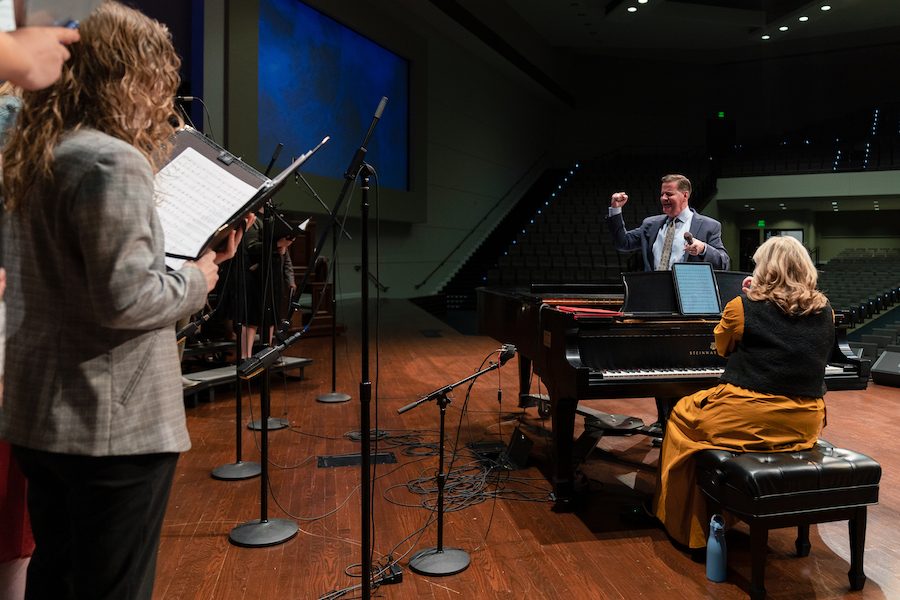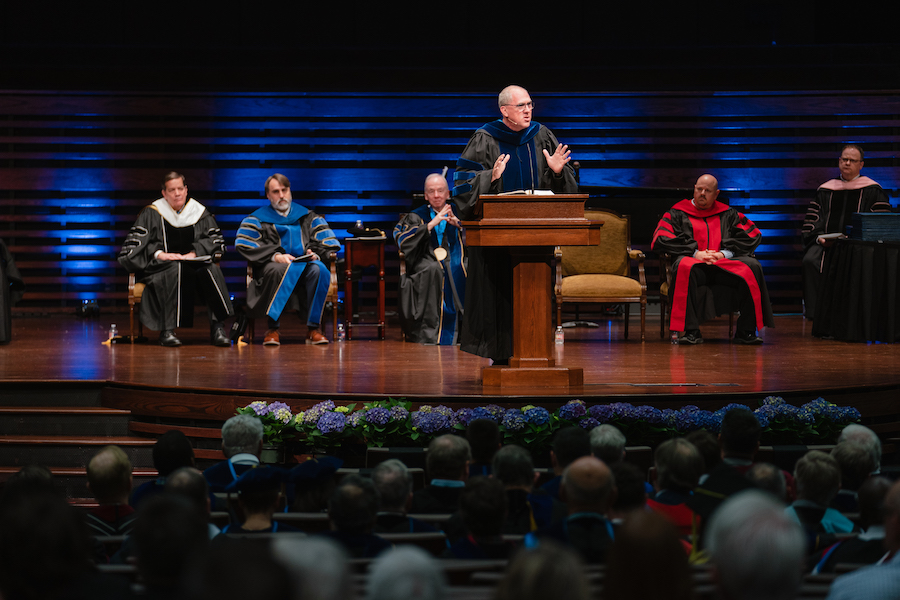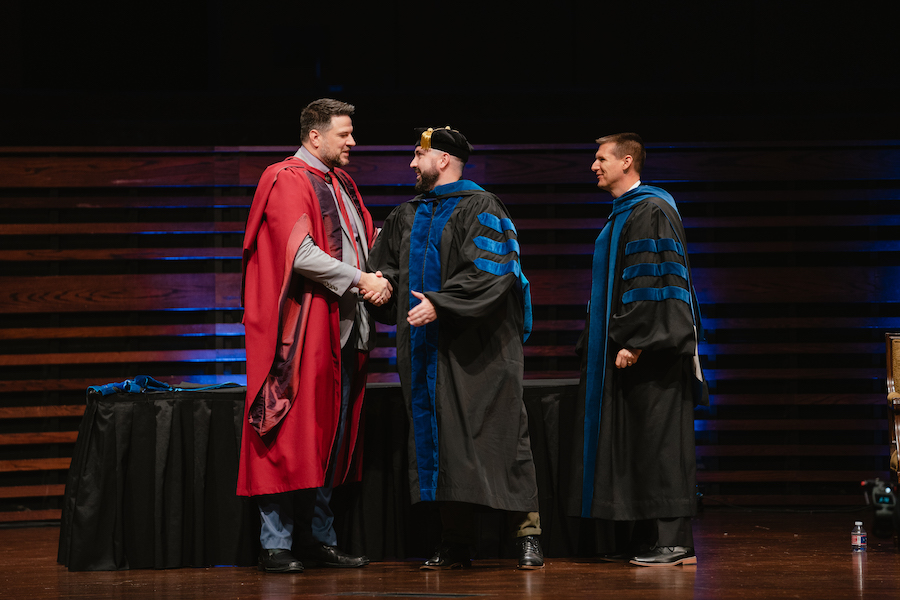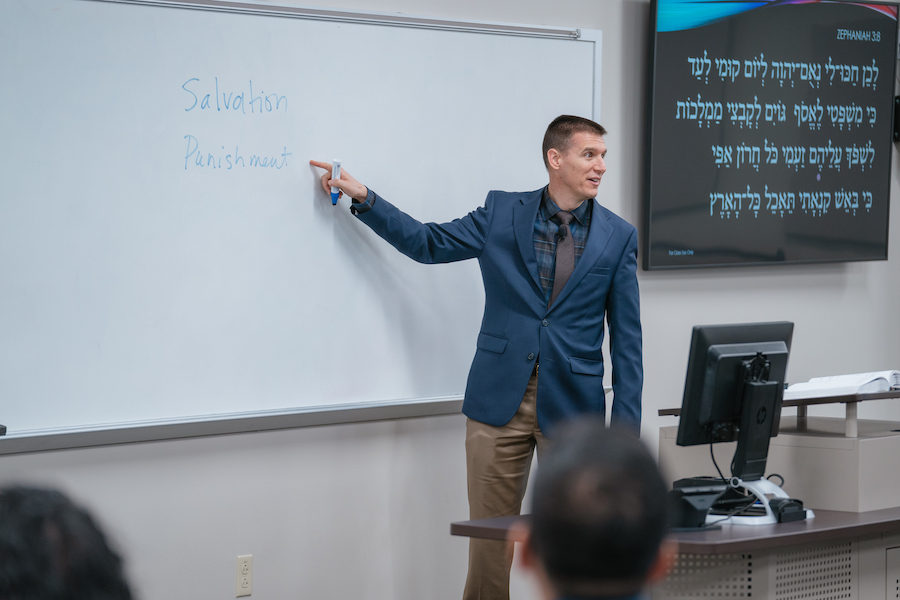During installation as Southwestern’s tenth president, Dockery offers challenge for renewed commitment to theological education
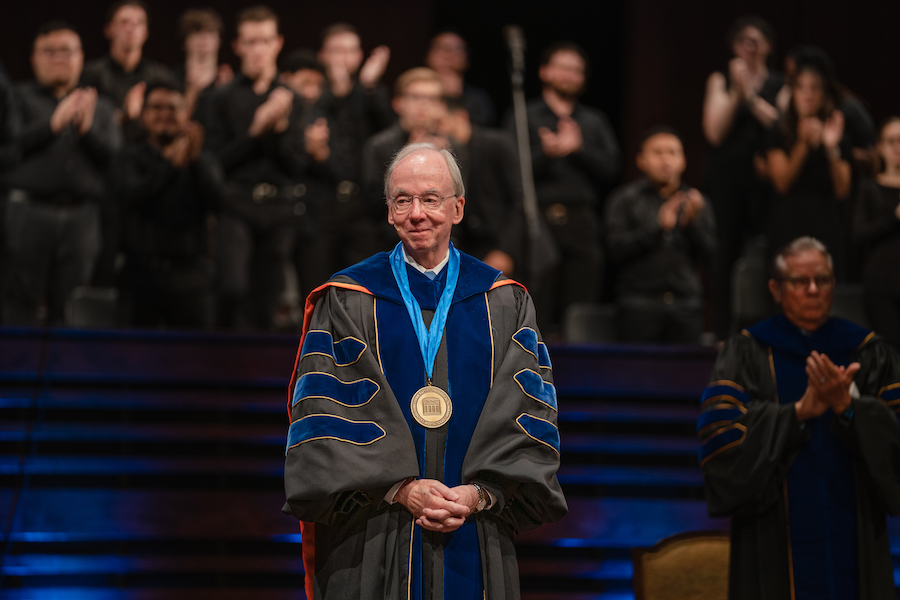
Beginning his 40th year of service in Christian higher education, David S. Dockery was officially installed as the tenth president of Southwestern Baptist Theological Seminary during an investiture ceremony that was part of the Aug. 22 convocation service at the Fort Worth institution.
In the presence of faculty, staff, students, trustee officers and new trustees, and guests, Board of Trustees Chairman Jonathan Richard exhorted Dockery to “continue the best of the Southwestern heritage to reflect the convictions of our founder, B.H. Carroll, regarding doctrinal fidelity, Gospel faithfulness, and a commitment to Christian unity and cooperation.”
Richard said, “We charge you to live, serve, and lead in a way that honors the Triune God and helps this community to live out its commitments to the Great Commandment and the Great Commission.” He asked Dockery to serve Southern Baptists and the evangelical community by “prioritizing the equipping of pastors, missionaries, worship leaders, teachers and educators, counselors and evangelists, as well as age group ministers.”
Dockery, who was elected president by the seminary’s board of trustees in April, committed to “serve faithfully in accordance” with the charge presented by Richard on behalf of the board of trustees.

David S. Dockery, tenth president of Southwestern Baptist Theological Seminary, receives the presidential medallion from Jonathan Richard, chairman of the seminary’s board of trustees. Dockery was elected president of the Fort Worth institution by the board of trustees in April and was installed as president during an investiture ceremony as part of the seminary’s Aug. 22 convocation service. The medallion features the seminary’s logo on the front and Dockery’s name engraved on the back.
In his convocation address following the ceremony, Dockery spoke about “the basics of theological education with particular reference to our work here at Southwestern.”
“I believe our focus today needs to be on the renewal of our understanding of and commitment to our primary mission of providing theological education, which encourages the Great Commandment and the fulfillment of the Great Commission,” he said.
Dockery noted theology is at the “heart of theological education” at Southwestern. While the statement might be “tautological” or “obvious,” he explained some might think theology is “abstract” because it “has been the path down which some have traveled to open the door to liberalism, heterodoxy or other wrongheaded thinking or practice.”
He contended, however, that “theology done correctly is essential for the transmission of the Christian faith from one generation to the next and is foundational, fundamental, and basic for the work of theological education.”
He added that “thinking rightly about God, which is the very essence of theology” is “vital” for everyone.
Dockery, who also serves as distinguished professor of theology, noted “Southwestern exists to serve the churches and we carry out this work primarily as the church’s teaching arm.”
Dockery noted the historical relationship between the church and theological education.
“The history of the church has been intertwined with this important work we call theological education, even though for many years it was carried out in informal settings – even as it continues to be in various contexts today,” Dockery observed.
He added the church is the “primary focus” of theology at Southwestern Seminary as the practice of theology is implemented “primarily by ecclesial theologians” who are “helping others reflect biblically and historically” on the Triune God and His Word, work, will, and world as they “prepare for a life of walking with God, and for worshiping and serving God, as well as for serving others.”
Noting “theology is certainly not the whole of church life nor does it by itself fulfill the expectations of the Great Commandment or the Great Commission,” Dockery said, “there must be a place to encourage faithful Christ followers to love God not only with heart, soul, strength, and our minds as well, and also to love one another” while simultaneously not allowing theology to “devolve into some kind of intellectual aloofness or uncommitted intellectual curiosity.” He explained “theology is grounded in holy Scripture” and is “shaped by serious biblical interpretation, careful historical reflection, and important philosophical considerations.”
Recognizing that theology is the “foundation” for “ministry inside and outside of the church,” Dockery said theology serves the church by helping followers of Christ to know God and Christ, to fulfill the teaching and apologetics ministries of the church, and to provide “reminders” of God’s greatness, goodness, and faithfulness. He said, “Theology connects everything that is taught here on this campus,” adding “in that sense we are all theologians.”
Tracing the “pattern of Christian truth” to include “key doctrines” such as the Bible as God’s written Word, God as Trinity and “creator, revealer, and redeemer,” men and women created in God’s image, the fall of humans, Jesus Christ “alone” as “the way, the truth, and the life,” while Christ also accomplished the redemption of humankind as the lone way to God for sinners, Dockery said, “At Southwestern we affirm and confess not only the essentials found in the pattern of Christian truth but the affirmations of the Baptist Faith and Message.”
Dockery added the “vital and essential truths” give a “framework for shaping a Christian worldview and Christian ethics to help us interpret and understand our place in this world.”
Citing a recent study in the book “The Great Dechurching,” Dockery said the authors contend that by the early 1990s almost one-third of Americans claimed to be evangelicals, although over the past decade that percentage has returned to lower numbers that predate an increase in the 1970s to the 1990s.
The authors “are right on target when they suggest that many of those who were a part of this great evangelical expansion lacked deep roots in the understanding of the Christian faith,” Dockery observed. “I think it must be acknowledged that we have contributed to this decline by our failure to emphasize serious discipleship, worldview formation, and the importance of theology, especially as the culture has become more secularized, polarized, and confused.”
He said the study’s authors call for “faithful and thoughtful theological, catechetical, and confessional renewal as the way forward for the church.”
“At Southwestern, we want to help individual Christians and churches produce deeper roots, and we do this by getting our own priorities right in what we are called to do as an institution, which includes emphasizing foundational beliefs that shape the life of the church and inform participation in the communion of the saints,” Dockery declared.
Theological educators, Dockery said, “must seek to reclaim the work of doing theology as an aspect of our overall purpose for the mission of the church, for the role of the pattern of Christian truth has served such a shaping role since the church’s earliest generations.”
Dockery said the “responsibility” to make “theology applicable for the church” lies with theological educators.
“Our calling to serve in the work of theological education is thus a call to develop mature believers, strengthening hearts, heads, and hands, which results in the praise and adoration of God,” said Dockery, adding that a “healthy theological education, founded on good theology, should always lead to doxology. Theology that does not lead to doxology may be intellectually stimulating, but it falls short of the biblical vision of the flourishing of God’s people for His eternal glory.”
He said the “calling” of theological educators includes helping God’s people express and determine “what they believe, practice, and proclaim” for the “good of believers” and their witness to the world.
“We believe that one of our chief responsibilities at Southwestern is the equipping of believers to both discern and live their calling,” Dockery observed. “This work of equipping, of building up of the people of God, includes pointing believers toward the unity and maturity of the faith that involves the full knowledge of God’s Son.”
Dockery added “one of the great strengths” of Southwestern’s history includes “intentional efforts to connect theology, spiritual formation, whole-life discipleship, [and] robust ministry preparation, combined with excellent classroom teaching.”
Explaining that the “collaborative work” of academics and ministers is “more important” at this time in history than previously, he said, “It is here that Southwestern is positioned, by its history, its heritage, and its current commitments to lead the way during the middle of the twenty-first century.” Regardless of academic discipline, he said collaborative efforts will lead to believers “growing in maturity, awareness, and desire for the worship of the one, true, and majestic God.”
Dockery added that “our prayer for the Southwestern community is for faithful educators” who are also “faithful” in service to the church.
Noting that Southwestern has been “intentional” in preparation in the areas of evangelism, missions, and ministry preparation since its founding in 1908, Dockery challenged the seminary community to “continue” and “even strengthen” the commitment to those three areas “without hesitation.” He said Southwestern takes “seriously our responsibility” in displaying to “the church and the world” Christian truth that is grounded in God’s inspired and inerrant Word and “depends on the regenerated mind” and “exposes the radical difference between Christianity and the insufficient worldviews and philosophies all around us.”
“We desire on this day to recommit ourselves to help God’s people seek to understand and communicate what the church believes, confesses, practices, and proclaims,” Dockery said.
Based on Paul’s exhortation in Ephesians 4, he challenged all facets of the Southwestern Seminary community to “live a life worthy of the calling we have received,” which Dockery said “manifests the virtues of humility, gentleness, patience, longsuffering, forbearance, and love, which leads to genuine Christian unity.”
Dockery added, “Jesus Himself said ‘love’ is the mark of true disciples.”
“The Southwestern community will only know genuine unity when these virtues carried out in love for one another characterize our lives both individually and corporately,” Dockery observed.
In his closing remarks, Dockery challenged the Southwestern community to “recommit ourselves afresh to academic excellence in teaching and scholarship, in research and service, as well as personal discipleship and churchmanship.”
“Let us seek to lay hold of the best of the Southwestern heritage and tradition, carrying it forward to serve the church and to engage the culture and the academy, doing so with convictional kindness,” Dockery concluded. “Let us not forget that service on behalf of faithful Southern Baptists and the broader evangelical world is both a privilege and responsibility, as well as a distinctive calling.”
Dockery, a 1981 Master of Divinity graduate of Southwestern, was the 2002 recipient of the seminary’s distinguished alumni award. He has served at Southwestern since 2019. A distinguished Baptist theologian and author, Dockery is the president emeritus of Union University in Jackson, Tennessee, where he served as president from 1996 to 2014. Dockery also served as the president of Trinity International University and Trinity Evangelical Divinity School (2014-2019). Dockery previously served churches in his native Alabama, Texas, and New York. He and his wife of 48 years, Lanese, have three grown sons and eight grandchildren.
Dockery’s entire message can be viewed here.
Chapel is held every Tuesday and Thursday morning at 10 a.m. (CT) in MacGorman Chapel on the campus of Southwestern Seminary and TBC. Chapel may be viewed live at swbts.live.
